Herbal teas like eucalyptus, peppermint, and ginger can really boost your respiratory system. Eucalyptus tea clears mucus and alleviates congestion, while peppermint acts as a natural decongestant, soothing your airways. Ginger tea supports lung function and eases throat irritation. You might also want to try chamomile for its anti-inflammatory properties or cayenne pepper tea to stimulate mucus flow. Regularly enjoying these teas can enhance your overall respiratory health and help fend off colds. Curious about how to brew the perfect blend? You'll discover plenty of helpful tips ahead!
Benefits of Herbal Teas
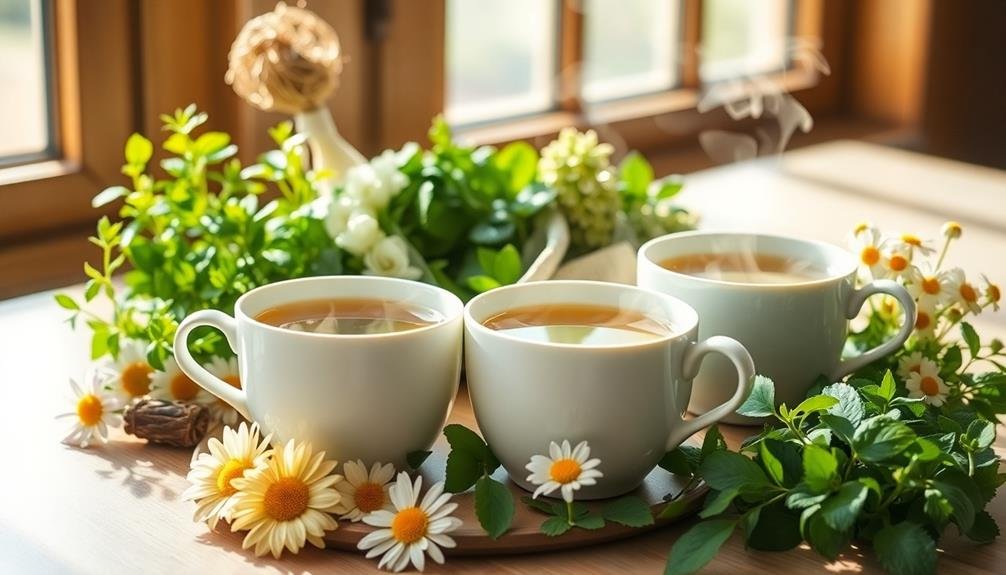
Drinking herbal teas can provide you with soothing relief and support your respiratory system in various ways. Many herbal teas contain natural anti-inflammatory properties that can help reduce irritation in your airways, making it easier for you to breathe. They can also thin mucus, which often leads to congestion, allowing you to clear your throat and lungs more effectively.
Additionally, herbal teas can boost your immune system, helping your body fend off colds and respiratory infections. Ingredients like ginger and peppermint can open up your air passages, promoting better airflow. The warm liquid itself is comforting, offering hydration that's vital for maintaining healthy mucous membranes.
Furthermore, sipping on herbal tea can help calm your mind and reduce stress, which is essential for overall well-being. Stress can negatively impact your respiratory health, so taking a moment to enjoy a cup of tea can be both a physical and mental health boost.
Key Ingredients for Respiratory Health
When it comes to enhancing your respiratory health, certain key ingredients in herbal teas can make a significant difference.
First up is eucalyptus. This powerful herb contains compounds that can help clear mucus and ease congestion, making it easier for you to breathe.
Then there's peppermint, which not only offers a revitalizing flavor but also acts as a natural decongestant, soothing your airways.
Another great ingredient is ginger. Known for its anti-inflammatory properties, ginger can help reduce airway irritation and promote better lung function.
Don't overlook thyme, either; its antibacterial properties can support your respiratory system by fighting off infections.
Licorice root is another essential addition, as it helps soothe sore throats and reduce inflammation.
Popular Herbal Teas to Try
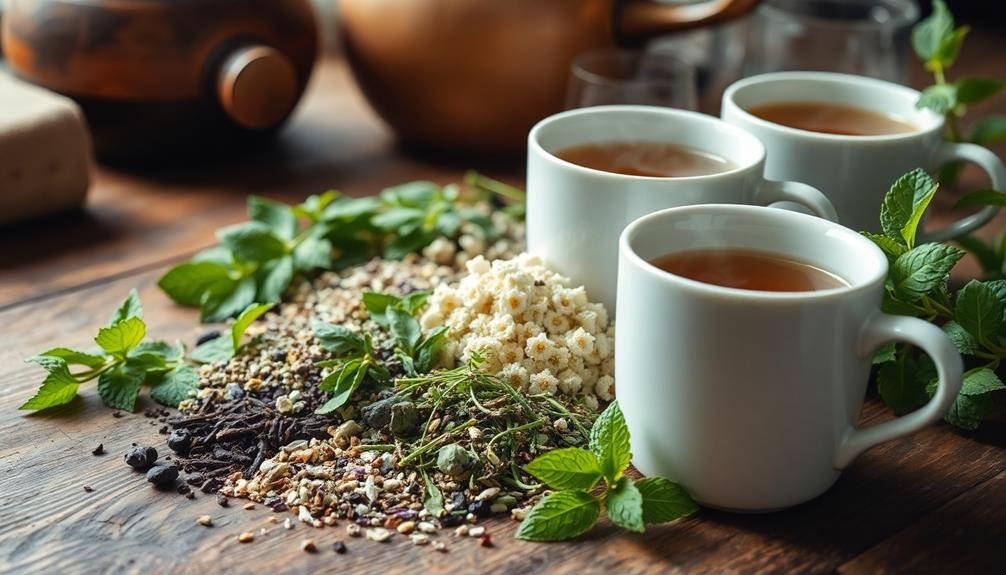
If you're looking to boost your respiratory health, trying out some popular herbal teas can be a great start. One standout is peppermint tea. Its menthol content helps open up your airways, making it easier to breathe. Plus, it's invigorating and soothing.
Another excellent choice is eucalyptus tea. Known for its anti-inflammatory properties, eucalyptus can help alleviate congestion and promote clearer breathing.
You might also want to contemplate ginger tea. Ginger's natural anti-inflammatory effects can support respiratory function and help ease throat irritation. If you enjoy a bit of spice, cayenne pepper tea is worth trying. It can stimulate mucus flow and relieve sinus pressure, providing a comforting warmth.
Don't overlook chamomile tea either; it can help reduce inflammation and promote relaxation, making it easier for you to breathe deeply.
Finally, thyme tea is another great option. It's packed with antioxidants and has antimicrobial properties that can support lung health.
Experimenting with these herbal teas can't only enhance your respiratory system but also offer a delightful experience. So, why not brew a cup today and see how you feel?
DIY Herbal Tea Blends
Creating your own herbal tea blends is a fun way to tailor flavors and benefits to your liking.
You'll want to know which essential ingredients work best for respiratory health and how to brew them properly.
Let's explore some key components and techniques to guarantee your DIY blends are both effective and enjoyable.
Essential Ingredients for Blends
As you explore the world of DIY herbal tea blends for respiratory health, knowing the essential ingredients is vital to crafting effective and soothing brews.
Start with herbs like eucalyptus and thyme, as they're known for their ability to clear congestion and support lung function. Eucalyptus offers a revitalizing aroma and can help open airways, while thyme contains compounds that may ease coughs and enhance respiratory strength.
Next, consider adding peppermint for its cooling properties and ability to soothe irritated throats. Ginger can also be a valuable addition, as it has anti-inflammatory properties that may help reduce respiratory discomfort.
Don't forget about chamomile; its calming effects can aid relaxation, which is essential when dealing with respiratory issues.
For a touch of sweetness, you can include honey, which not only enhances flavor but also acts as a natural cough suppressant.
Finally, think about incorporating citrus peels or lemongrass to add a zesty note and boost vitamin C content.
Brewing Techniques Explained
Knowing the right brewing techniques can elevate your DIY herbal tea blends for respiratory health to a whole new level. Start by using fresh, high-quality herbs; the better the ingredients, the better your tea will taste and benefit you. Measure about one tablespoon of dried herbs or two tablespoons of fresh herbs for every cup of water.
Next, heat your water to the appropriate temperature—around 200°F for most herbal teas. Avoid boiling water, as it can scorch delicate herbs and diminish their beneficial properties. Pour the hot water over your herbs in a teapot or infuser, covering them completely.
Steep your blend for 5 to 10 minutes, depending on the strength you desire. Remember, longer steeping times may result in a more robust flavor but could also introduce bitterness.
Once steeped, strain the herbs and consider adding natural sweeteners like honey for added flavor and respiratory benefits.
How to Brew Herbal Tea
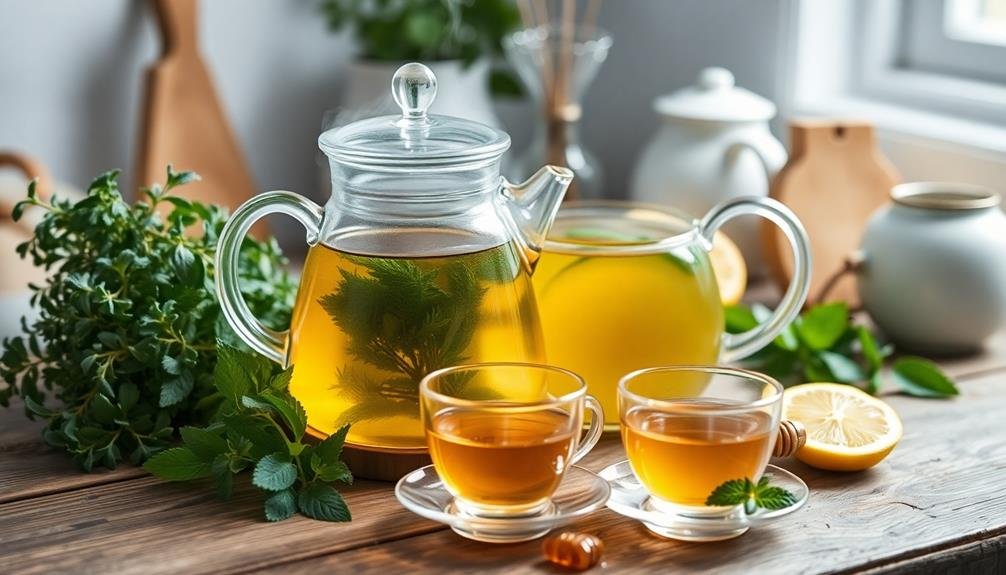
To brew the perfect herbal tea, you need to start with quality herbs that enhance flavor and health benefits.
Once you've selected your herbs, understanding the right brewing techniques will make all the difference.
Let's explore how to choose the best ingredients and brew them for ideal respiratory health.
Selecting Quality Herbs
When selecting quality herbs for brewing herbal tea, it's essential to guarantee freshness and potency. The right herbs can enhance your respiratory health, so choosing wisely makes a difference. Here are some tips to help you pick the best herbs:
- Source: Look for reputable suppliers who specialize in herbal products. This confirms you're getting high-quality herbs.
- Appearance: Fresh herbs should look vibrant and aromatic. Dull colors or a lack of scent can indicate aging.
- Organic options: Whenever possible, opt for organic herbs to avoid pesticides and chemicals that might harm your health.
- Whole vs. ground: Whole herbs typically retain their potency longer than pre-ground options. Choose whole herbs and grind them just before brewing for maximum flavor.
- Storage: Confirm the herbs are stored in a cool, dark place. Proper storage prevents loss of essential oils and flavors, keeping your tea effective.
Brewing Techniques Explained
Brewing herbal tea can elevate your respiratory health, but it's important to get it right. Start by choosing quality herbs, whether dried or fresh. For dried herbs, use about one tablespoon per cup of water, while fresh herbs require about three tablespoons.
Next, bring water to a rolling boil, then remove it from heat. Pour the hot water over the herbs in your teapot or infuser. Steep the tea for 5 to 15 minutes, depending on the strength you prefer. Longer steeping extracts more flavor and beneficial compounds, but be cautious—over-steeping can lead to bitterness.
Once steeped, strain the tea to remove the herbs. You can enhance the flavor with a squeeze of lemon, a drizzle of honey, or a sprinkle of cinnamon, which also brings additional health benefits.
Precautions and Considerations
Herbal teas can offer numerous benefits for respiratory health, but it's essential to approach them with caution. Not all herbal ingredients are safe for everyone, and some may interact with medications or exacerbate existing conditions.
Before you plunge into the aromatic world of herbal teas, consider these important precautions:
- Consult your healthcare provider: Always talk to your doctor, especially if you have underlying health issues or are pregnant.
- Know your allergies: Check for any potential allergies to specific herbs, as they can trigger reactions.
- Monitor dosage: Herbal teas can be potent, so follow recommended guidelines and avoid excessive consumption.
- Be aware of interactions: Some herbs may interact with medications, affecting their efficacy or causing side effects.
- Start slowly: If you're new to herbal teas, introduce one at a time to gauge how your body responds.
Enhancing Your Tea Ritual
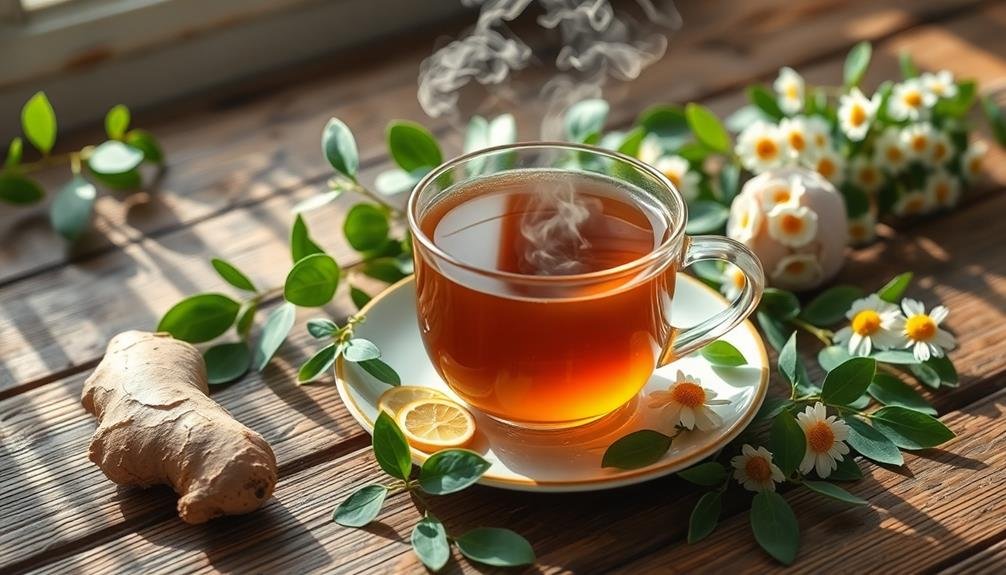
After taking the necessary precautions with herbal teas, it's time to elevate your tea ritual. You can transform your experience by incorporating simple yet effective elements that enhance flavor and tranquility. Start by selecting a beautiful teapot or mug that resonates with you. The aesthetic can greatly impact your mood.
Consider setting the ambiance. Dim the lights, play soft music, or light a candle. This creates a cozy atmosphere, making your tea time feel special. Remember, it's not just about drinking tea; it's about savoring the moment.
Next, experiment with different tea blends. You might find a favorite combination that truly resonates with your respiratory health.
Here's a quick guide to help you enhance your tea ritual:
| Element | Purpose | Benefit |
|---|---|---|
| Beautiful Teapot | Aesthetic appeal | Enhances the overall experience |
| Cozy Ambiance | Relaxation | Reduces stress and anxiety |
| Unique Blends | Flavor exploration | Keeps the ritual exciting |
| Mindfulness | Focus on the moment | Promotes mental clarity |
Frequently Asked Questions
Can Children Safely Consume Herbal Teas for Respiratory Health?
You should be cautious when giving children herbal teas for respiratory health. Some herbs can be safe, while others may cause reactions. Always consult a pediatrician before introducing any herbal remedies to your child's routine.
Are There Any Side Effects From Herbal Teas on Respiratory Conditions?
Yes, herbal teas can have side effects on respiratory conditions. You might experience allergic reactions or interactions with medications. It's important to consult a healthcare professional before using herbal teas to guarantee they're safe for you.
How Long Does It Take to Feel Respiratory Benefits From Herbal Teas?
You might start noticing respiratory benefits from herbal teas within a few days to a week. Consistency is key, so enjoy your tea regularly to maximize its potential effects on your respiratory health.
Can Herbal Teas Interact With Prescription Medications for Respiratory Issues?
Yes, herbal teas can interact with prescription medications for respiratory issues. It's vital you consult your healthcare provider to guarantee there's no adverse effect, as certain herbs may enhance or diminish the effectiveness of your medications.
What's the Best Time of Day to Drink Herbal Tea for Respiratory Support?
You'll get the most benefits from drinking herbal tea for respiratory support in the evening. It helps relax your body and promotes better sleep, allowing your respiratory system to recover overnight. Enjoy your soothing cup!
In Summary
Incorporating herbal teas into your routine can be a simple yet effective way to support your respiratory health. With the right ingredients, you can enjoy delicious blends that not only taste great but also offer benefits for your lungs. Experiment with different teas and DIY blends to find what works for you. Remember to pay attention to any precautions, and make your tea ritual a calming part of your day. Cheers to your health!



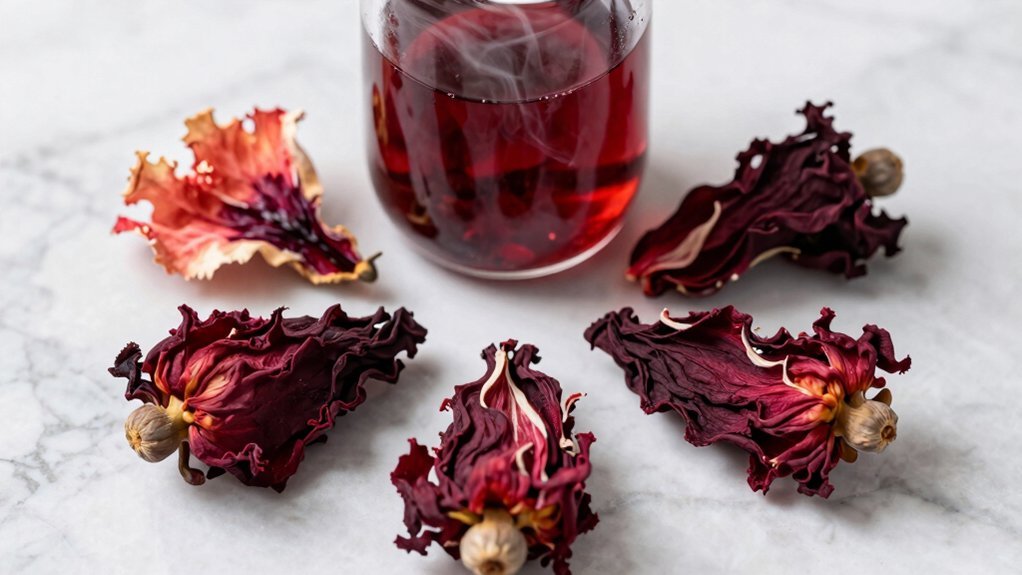

Leave a Reply